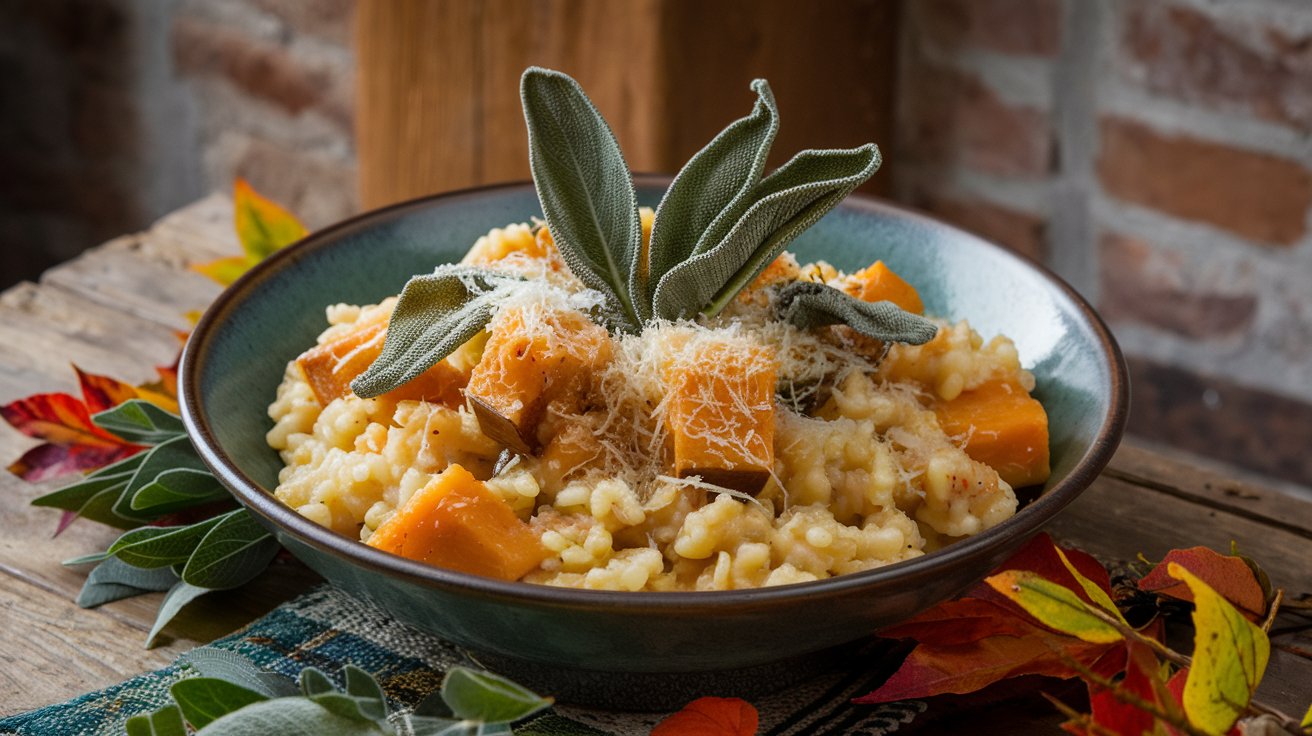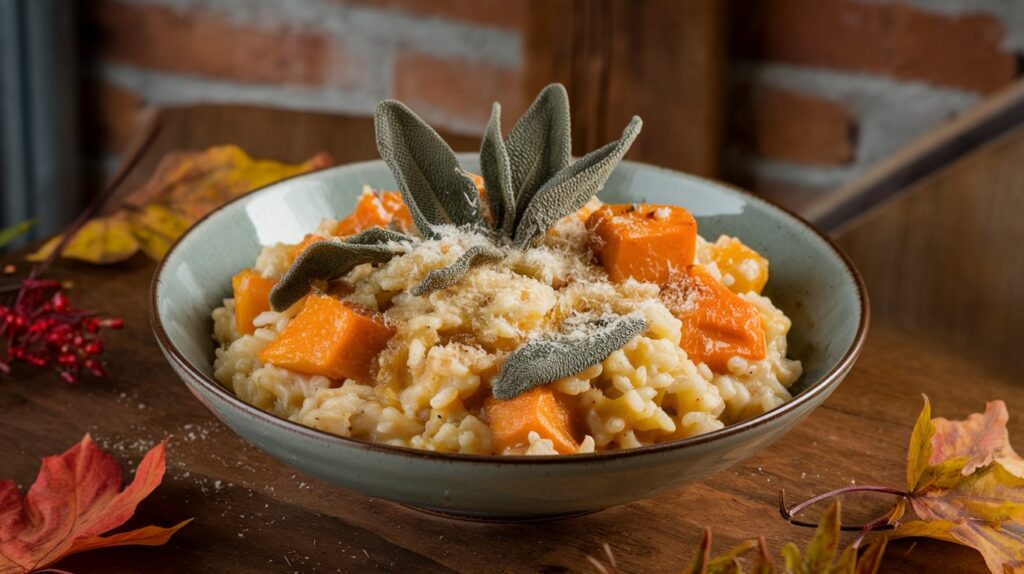As the crisp fall air settles in, there’s nothing quite as comforting as a warm, hearty meal that embraces the flavors of the season. Imagine sitting down to a creamy, savory bowl of butternut squash and sage risotto—the sweetness of roasted squash paired with the earthy aroma of fresh sage, all enveloped in the richness of Arborio rice. This dish not only celebrates the best of autumn’s produce but also brings a sense of comfort and joy that only a bowl of homemade risotto can provide.
Whether you’re preparing it for a cozy weeknight dinner or serving it at a special gathering, this butternut squash and sage risotto will undoubtedly become a favorite. Let’s dive into why this dish is so special, the ingredients you’ll need, and how you can master the art of making it at home.
What Makes Butternut Squash and Sage Risotto Special?
The Perfect Flavor Pairing
Butternut squash is a fall favorite, known for its natural sweetness and smooth, velvety texture. When roasted, it caramelizes, intensifying its flavor and adding a rich, sweet undertone to the dish. Sage, on the other hand, offers an earthy, slightly peppery flavor with hints of pine and citrus. When combined, these two ingredients create a balance of sweetness and savory depth that makes this risotto truly exceptional.
A Versatile Dish for Any Occasion
Whether you’re hosting a dinner party or just enjoying a quiet night in, butternut squash and sage risotto is an incredibly versatile dish. It can be served as a main course or paired with proteins like roasted chicken, grilled shrimp, or even a light salad. The creamy texture of the risotto makes it satisfying on its own, while the roasted squash and fragrant sage add an extra layer of complexity and flavor.
A Taste of Fall in Every Bite
This risotto is a perfect way to embrace the flavors of the season. The combination of seasonal ingredients like squash and sage brings a cozy, comforting vibe to your meal. It’s a dish that invites you to slow down and savor the moment, making it ideal for enjoying with loved ones around the table.
Ingredients You’ll Need for Butternut Squash and Sage Risotto
Before you start cooking, gather the following ingredients to make this delicious risotto:
| Ingredient | Amount | Purpose |
|---|---|---|
| Butternut squash | 2 cups diced | Provides sweetness and a rich, creamy texture when roasted. |
| Arborio rice | 1 1/2 cups | The main ingredient; creates the creamy consistency. |
| Vegetable or chicken stock | 4 cups | Adds depth of flavor to the risotto. |
| Onion (finely chopped) | 1 medium | Provides a savory flavor base. |
| Garlic (minced) | 2 cloves | Adds fragrance and richness. |
| Fresh sage (chopped) | 2 tbsp | Brings earthy, aromatic depth to the dish. |
| Parmesan cheese (grated) | 1/2 cup | Adds creaminess and a sharp, salty flavor. |
| Olive oil | 2 tbsp | For sautéing and added richness. |
| Butter | 2 tbsp | Adds a velvety finish to the dish. |
| Salt and pepper | To taste | Enhances all the flavors. |
| Optional: White wine | 1/4 cup | Adds a depth of flavor when deglazing. |
These ingredients come together to create a dish that’s both comforting and full of flavor. For the best results, use fresh sage and high-quality Parmesan cheese to elevate the taste of your risotto.
How to Make Butternut Squash and Sage Risotto: A Step-by-Step Guide
Step 1: Roast the Butternut Squash
The first step in making butternut squash and sage risotto is roasting the squash. This process intensifies the sweetness and brings out the natural caramelization of the squash.
- Instructions: Preheat your oven to 400°F (200°C). Toss the diced butternut squash with olive oil, salt, and pepper. Spread the squash in a single layer on a baking sheet and roast for 25-30 minutes, or until it’s tender and slightly browned around the edges.
- Tip: For extra flavor, you can add a sprinkle of cinnamon or nutmeg before roasting to bring out even more warmth.
Step 2: Prepare the Risotto Base
While the squash is roasting, prepare the risotto base. This step builds the foundation of flavor for your dish.
- Instructions: In a large pan or skillet, heat 1 tablespoon of olive oil over medium heat. Add the finely chopped onion and minced garlic, sautéing until soft and fragrant, about 3-4 minutes.
- Tip: Be careful not to brown the garlic, as it can become bitter.
Step 3: Toast the Rice
Toasting the Arborio rice before adding the liquid is an essential step in making perfect risotto. It enhances the nutty flavor of the rice and helps it absorb the broth more evenly.
- Instructions: Add the Arborio rice to the pan and stir it around for 2-3 minutes, ensuring each grain is coated with the oil and slightly toasted.
- Why This Step Is Important: Toasting the rice enhances its nutty flavor and prepares it to absorb the broth, creating the creamy texture risotto is known for.
Step 4: Gradually Add the Stock
Now it’s time to add the liquid and transform the rice into a creamy risotto.
- Instructions: Add the warm stock, one ladleful at a time, to the rice. Stir constantly, allowing the rice to absorb the liquid before adding more.
- Tip: Keep the stock warm in a separate pot to maintain the cooking temperature of the risotto. This ensures a smooth, even cooking process.
Step 5: Add Roasted Butternut Squash and Sage
Once the risotto is creamy and the rice is al dente, it’s time to add the roasted butternut squash and sage. The squash should be tender and golden, with a slight caramelized edge.
- Instructions: Stir the roasted squash and chopped sage into the risotto, followed by butter and grated Parmesan cheese for extra creaminess.
- Tip: Save some of the roasted squash for garnish to add texture and visual appeal to your dish.
Step 6: Finish and Serve
Finally, taste the risotto and adjust the seasoning with salt and pepper. Serve it hot, topped with extra sage or Parmesan if desired.
- Presentation Tip: A drizzle of olive oil or a sprinkle of toasted pine nuts can add extra richness and texture.
Tips for Perfect Butternut Squash
and Sage Risotto
- Stir Constantly: Risotto requires your attention! Stir frequently to ensure the rice releases its starch and creates that creamy texture you’re aiming for.
- Adjust the Texture: If your risotto becomes too thick as it cooks, add more stock or a splash of warm water to achieve the right consistency.
- Flavor Variations: If you want to get creative, try adding roasted garlic, a splash of white wine, or a sprinkle of nutmeg to give the risotto even more depth.
Health Benefits of Butternut Squash and Sage Risotto
- Butternut Squash: Packed with vitamins A and C, butternut squash supports immune health and promotes healthy skin. It’s also rich in fiber, aiding digestion.
- Sage: Known for its anti-inflammatory properties, sage has been linked to improved brain function and memory retention.
- Arborio Rice: Arborio rice provides a quick energy boost thanks to its carbohydrate content, and it’s a great source of fiber when eaten in moderation.
Serving Suggestions for Butternut Squash and Sage Risotto
- Pair with Proteins: Serve your risotto alongside roasted chicken, grilled shrimp, or a light salad with lemon vinaigrette for a balanced meal.
- Wine Pairing: A glass of Chardonnay or Sauvignon Blanc will perfectly complement the creamy texture and savory flavors of the dish.
How to Store and Reheat Leftovers
Storing Leftovers
Let the risotto cool completely before transferring it to an airtight container. It can be stored in the refrigerator for up to 3 days.
Reheating Leftovers
To reheat, place the risotto in a pan over medium heat with a splash of stock or water to restore its creamy texture. Stir constantly to heat it evenly.
FAQ: Butternut Squash and Sage Risotto
Can I make this risotto ahead of time?
Yes, you can prepare the risotto up to the point of adding the roasted squash and sage. When you’re ready to serve, simply heat it on the stove and finish with the squash and seasonings.
Can I use other types of squash?
While butternut squash is ideal, you can use acorn or delicata squash as a substitute. The cooking time may vary slightly, so keep an eye on it.
Can I make this dish dairy-free?
Absolutely! Substitute the butter and Parmesan with plant-based alternatives such as olive oil and vegan cheese.
How do I get the risotto creamy without overcooking the rice?
The key is to stir frequently and add the stock gradually, letting each ladle of liquid absorb fully before adding more. Cook the rice until it’s tender but still slightly firm to the bite.









